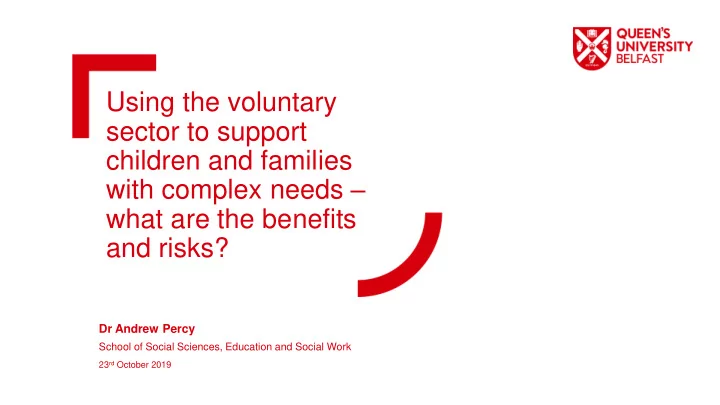

Using the voluntary sector to support children and families with complex needs – what are the benefits and risks? Dr Andrew Percy School of Social Sciences, Education and Social Work 23 rd October 2019
Research Question 1 Research Question 2 Research Question 3 What are the main issues with What is currently known about Does the voluntary sector the commissioning, how services provided by the supplement, hinder or governance and delivery of voluntary sector can influence substitute statutory social work services by the voluntary family outcomes and does this services? sector? differ depending on the model of delivery and/or governance used?
Methodology Stage 1: Rapid reviews (x2) of the international research literature A: Commissioning, governance and delivery of services by the voluntary sector B: Voluntary sector service provision and family outcomes Stage 2: Knowledge exchange Stage 3: Final review and consolidation
1. Rapid Reviews (x2) A: Screened around 7,500 papers Detailed assessment of 400 papers Included 161 papers in review B: Screened around 7,000 papers Detailed assessment of 121 papers Included 71 papers in review
2. Knowledge exchange 1. Distribution of the written report on review findings to stakeholders 2. Verbal briefings on the review findings for evaluators undertaking the learning reviews of funded projects 3. Discussions on the extent to which these review findings were applicable to the services that were being reviewed and how these findings could be used to inform ongoing and/or future learning reviews.
3. Final review and consolidation Analysis of seven learning reviews of the VS services funded by the EITP • To identify commonalities across the voluntary sector services • To compare learning reviews with the findings emerging from the rapid reviews • To provide insights into the extent to which these international findings may be applicable to the Northern Ireland context.
Findings: Benefits Commissioning the voluntary sector to provide services to children and families with complex needs was largely beneficial, • Better matched service to user needs • Increased creativity in service design • Increased trust between providers and service users • More successful advocacy for those with complex needs. HOWEVER…..
Findings: Commissioning Commissioning processes can have a negative impact on VS services: • Contract culture (categorical funding) • Loss of political and financial independence • Commissioning is highly complex • Mismatch between needs and services • Admin burden (on all parties) • Fosters competition not collaboration • Competitive tendering does not always result in a more cost-effective or efficient service provision
Findings: Governance Concerns were identified in the literature regarding governance and oversight: • Quantity vs quality • Quantity vs complexity of needs • Fostering interagency collaboration and partnership (power imbalances) • Limited expertise in programme evaluation
Findings: Improving outcomes Engaging with hard to reach clients Providing personalised service for complex needs Promoting interagency collaboration • Co-location • Shared resources • Improved communication • Shared decision-making • Service user involvement • Case coordinators Commissioning can inhibit this work
Substitute, Supplement, or hinder Substitute: the ability of VS to assume sole responsibility for providing services depends on the willingness of officials to allow voluntary organisations to assume this responsibility Supplement: Where the state is unable to provide services or clients unwilling to engage with them (political conflict) VS can supplement Hinder: No barriers to effective services are unique to VS, but rather linked to the wider challenges involved in developing effective interagency collaboration and organisation culture.
Gaps in the knowledge base Studies tend to be: • small sample size, • focused on the perspective of staff • Limited engagement with children and families • Lacking a multi-disciplinary perspective • Little work linking performance indicators with actual outcomes More research is required
Recommend
More recommend